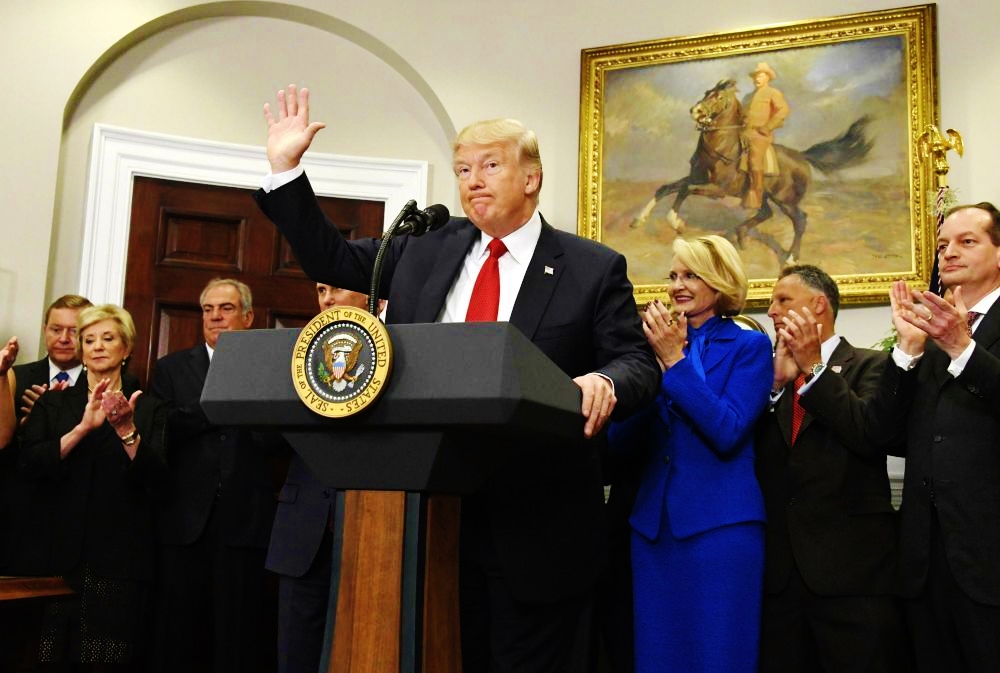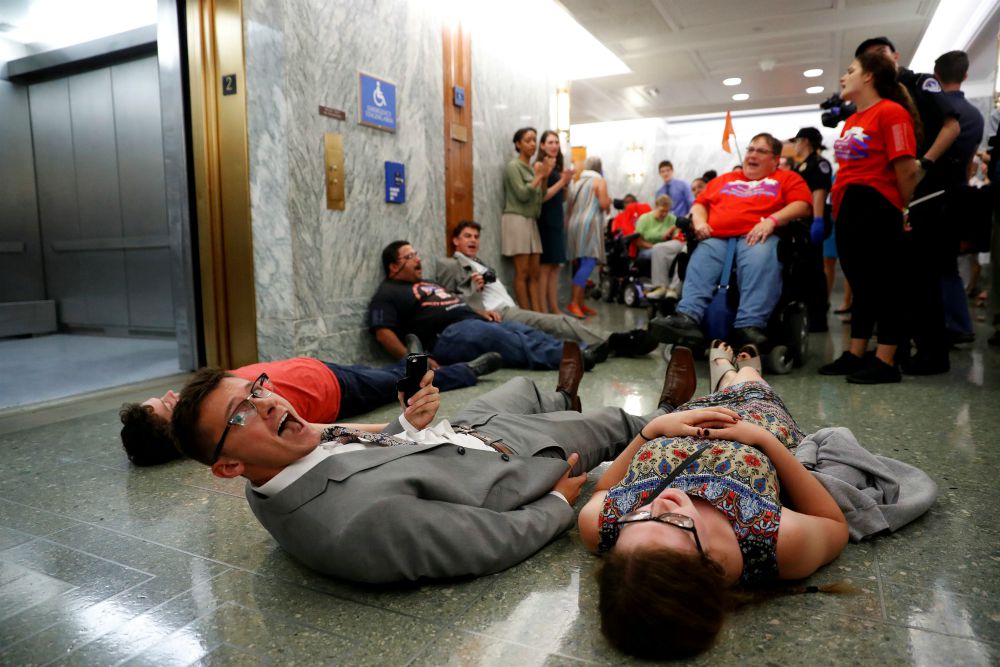
President Donald Trump waves after making remarks prior to signing an Executive Order to promote healthcare choice and competition in the Roosevelt Room of the White House in Washington, D.C. on Oct. 12. (Newscom/SIPA/Ron Sachs)
Over two days last week, President Donald Trump took decisive action to hobble the Affordable Care Act, also known as Obamacare. It's not exactly the repeal-and-replace that Trump promised in his campaign last year, but these and other actions could damage the ACA beyond repair.
Advocates for comprehensive health care — Catholics among them — say the executive actions didn't surprise them but have frustrated them.
The U.S. Catholic bishops warned political leaders against using health care "as a bargaining chip," saying that would "strike at the heart of human dignity and the fundamental right to health care."
On Oct. 12, Trump signed an executive order that would allow short-term policies and trade association insurance coverage, circumventing the mandate that all people have insurance coverage or face a penalty and allowing insurance sales across state lines.
On Oct. 13, he announced that the federal government would no longer reimburse insurers for offering cost-sharing reduction payments (CSRs) — subsidies that are required by the Affordable Care Act to defray out-of-pocket costs tied to medical care — to consumers earning less than 250 percent of the federal poverty level.
These actions could result, long-term, in the demise of President Barack Obama's signature achievement. In the immediate term, they seem likely to lead some insurance companies to pull out of the marketplace, drive up monthly premiums for middle-income consumers who don't receive any subsidies and, ironically, increase rather than reduce federal deficits.
Trump has made the repeal and replacement of the Affordable Care Act a top priority. In this effort, he has been both enabled and stymied by a Republican-led Congress, which has failed in as many as 70 attempts, by some counts, to kill the law.
Advertisement
Thwarted by holdouts within the party — including Sen. John McCain (R-Ariz.), who squashed a repeal attempt in July with a dramatic thumbs-down vote, and others whose defections kept the last-ditch Graham-Cassidy repeal bill from even coming up for a vote in September — Trump now seems determined to do by executive order and market disruption what Congress can't or won't do for him.
The focus on the ACA has also led to a delay in the reauthorization of the Children's Health Insurance Program (CHIP), upon which almost 9 million children depended for their health insurance in FY2016.
"The president took a really good shot at the marketplace last night," said Karen Pollitz, a senior fellow at the Henry J. Kaiser Family Foundation, on Oct. 13. "And it's not clear yet what that will mean for actual people who buy their coverage there."
"This has been some month," said Daughter of Charity Sr. Carol Keehan, president and CEO of the Catholic Health Association, a leadership organization of more than 2,000 Catholic hospitals and health care facilities. "I'm not surprised; I'm frustrated. None of this is consistent with Catholic social teaching."
After the failure of the last repeal attempt in September, which studies showed would have caused millions of Americans to lose their health insurance, Catholic advocates for health care reform had hoped that bipartisan work on fixing elements of the ACA would continue, with Sens. Lamar Alexander (R-Tenn.) and Patty Murray (D-Wash.) leading the efforts.
"Those are two very smart people in health care, two very collegial people," said Keehan. "They do have a sense of what's important in the lives of real people. They understand the horrible impact it has when you don't have health insurance, particularly for low-income and middle Americans."
But where the president's latest actions leave those efforts is unclear.
Trump has been threatening since he took office to end the cost-sharing reduction payments to insurance companies, which Republicans have said are illegal to begin with, since Congress never appropriated funds to pay for them. The CSRs will come to about $7 billion for 2017 ($10 billion for 2018), and insurance companies will not be reimbursed for the final three months of this calendar year, since their 2017 rates were already locked in at the time of Trump's announcement.
"I think most insurers in most states saw this coming, so when they filed their rates for 2018, they built a really big rate increase in, just in case the president cancelled this," said Pollitz of the Kaiser Family Foundation.
She added, before advising that consumers have their insurance in place by Thanksgiving, to avoid last-minute logjams on health care.gov, "It seems pretty clear that this administration intends to run the program [the ACA] in a way that will undercut it and not allow it to run smoothly."
In a statement by the U.S. Conference of Catholic Bishops, Bishop Frank J. Dewane of Venice, Florida, chairman of the USCCB Committee on Domestic Justice and Human Development, said, "The Affordable Care Act is, by no means, perfect, but as leaders attempt to address impending challenges to insurance market stability and affordability, they must not use people's health care as leverage or as a bargaining chip. To do so would be to strike at the heart of human dignity and the fundamental right to health care."
In addition to the CSRs, people making less than 400 percent of the federal poverty level are eligible for a premium subsidy, which will still be paid for by the federal government. But because insurers will try to recoup their costs for the CSRs by increasing premiums, premium subsidies will also rise. As a result, according to the nonpartisan Congressional Budget Office, doing away with the cost-sharing reductions will actually increase federal deficits by $194 billion in the next 10 years.
The administration has already been chipping away at the ACA in other ways, according to Lucas Allen, a health care fellow at the lobbying group NETWORK. Allen said the upcoming enrollment period, which begins Nov. 1, has been cut nearly in half, ending this year on Dec. 15 instead of the end of January. Health care.gov is unavailable for 12 hours on most Sundays during this period, and marketing efforts have been slashed, as have the number of people available to help consumers compare and choose plans through "navigator" programs; the Trump administration has cut next fiscal year's $60 million budget for navigators by more than 40 percent, according to the Kaiser Family Foundation.
"It all adds to sense of destabilization," said Allen. "But we believe that we shouldn't let politics get in the way of good policy. This would really help people."
In a statement, Social Service Sr. Simone Campbell, Network executive director, said, "People of faith call on Congress and the Administration to care for the common good and stabilize the individual marketplace, not sow chaos. … I urge the Administration to abandon all ACA sabotage and instead act to meet the needs of our people."

Demonstrators lie on the floor in protest Sept. 25 as the Senate Finance Committee holds a hearing on the latest Republican effort to repeal and replace the Affordable Care Act on Capitol Hill in Washington. (CNS/Reuters/Aaron P. Bernstein)
Of additional concern is CHIP, which was allowed to expire on September 30, a victim of congressional failure to come to any kind of bipartisan resolution on health care issues. The program was introduced in 1997 and is largely federally funded but administered by the states. It covered about 8.9 million children in FY2016 whose family income was too high to qualify for Medicaid. By comparison, 37 million children were insured through Medicaid in FY2016, according to the Kaiser Family Foundation.
Kaiser estimated that the majority of states would face a CHIP funding shortfall for FY2018, with 11 states expected to run out of money by the end of 2017, and 32 more by March 2018. States get matching federal funding, up to an annual limit, and the loss of such funds will result in children being cut from the insurance rolls.
A replacement bill, the Keep Kids' Insurance Dependable and Secure Act of 2017 (KIDS), sponsored by Sens. Orrin Hatch (R-Utah) and Ron Wyden (D-Ore.), would reauthorize CHIP funding for five years. It is pending.
"Health care for kids should not be held up by what programs should be cut to offset the cost," said Allen, noting that CHIP has historically had broad bipartisan support.
"Republicans are not concerned with how to pay for tax cuts for wealthy individuals and corporations in their tax cut plan, which would add $1.5 trillion to the deficit. CHIP costs much less than that, at less than $20 billion per year," Allen said.
Of the larger health care debate, to which CHIP has, in a sense, been held hostage, he added, "It's not for the common good, it's for political gain."
[Julie Bourbon is a freelance writer based in Washington.]







